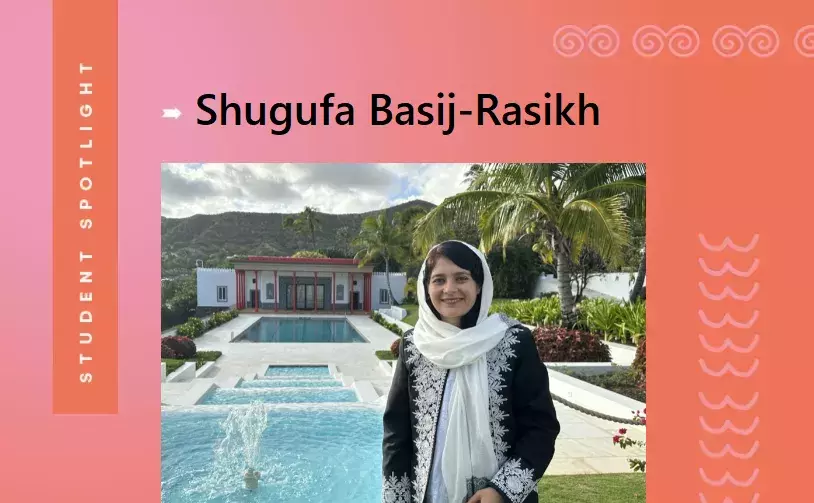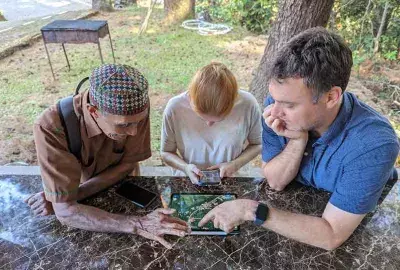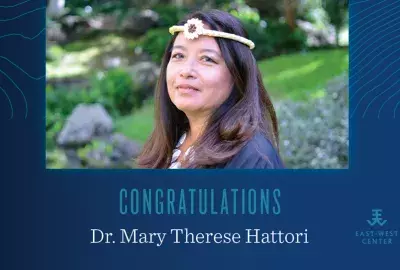Error message

OFFICE/DEPARTMENT
Shugufa Basij-Rasikh is a PhD candidate in Public Health with a heartfelt commitment to helping others. Her journey at the East-West Center began in 2017 when she joined the Asia Pacific Leadership Program (APLP), eager to develop her leadership skills. During her time at APLP, she focused her project on waste management in Sri Lanka. Later on, Shugufa joined the World Health Organization, where her project with the Afghanistan Ministry of Public Health ignited a passion for health service management and policy, leading her to pursue a PhD in Public Health through the Graduate Degree Fellowship (GDF) at East-West Center in Fall 2021. Recently, she transitioned to the Student Affiliate program after her fellowship ended, in order to continue her participation with the Education Program for the rest of her PhD studies.
Shugufa’s selection for the GDF coincided with a significant turning point in her life and in the lives of many of her countrymen and women: the US troop withdrawal from Afghanistan. During this challenging period, she had to make the difficult decision to leave her home and evacuate her family from Afghanistan while looking for refuge and applying for a student visa to pursue her studies at the University of Hawai‘i at Mānoa, Shugufa said, “EWC Education Program Staff [Dean of Education, Ann Hartman and GDF coordinator, Dr. Steve Bell] along with my PhD advisor Dr. Kathryn Braun gave me huge support.”
Shugufa is deeply committed to humanitarian work, especially supporting Afghan families in need during the harsh winter months. Her dedication to this cause began in 2011 when she learned about a family in Afghanistan affected by the civil war. The father, who had an amputated leg, was unable to provide for his family. Hoping to help the family, Shugufa took it upon herself to collect donations from her peers, often as little as $5 or $10 at a time. Through this collective effort, they were able to provide the family with essential care packages that included both sustenance and firewood to endure the cold winter months. Since then, her humanitarian work has reached even more families. Shugufa emphasizes that even small contributions can make a significant impact, providing essential food supplies like rice, flour, oil, sugar, beans, chickpeas, and lentils.
Shugufa draws her inspiration for humanitarian work from her family, particularly her sister's actions during the US troop withdrawal from Afghanistan. At the time, Shugufa’s sister was overseeing a boarding school with 130 girls. In an incredible display of resilience and compassion, she successfully orchestrated the safe evacuation of all her students and school staff from Afghanistan to a new country, ensuring their continued pursuit of education without endangering their well-being.
Her journey of leaving her homeland was difficult, but Shugufa discovered a strong support system in her Hale Mānoa dormitory. Here, she and her friends frequently share dishes from their respective homes and provide support during academic stress. For Shugufa,
“Respect is the most important value of living in a shared space where residents come from different cultural, religious, and family backgrounds.”
Shugufa Basij-Rasikh
Currently, Shugufa is working on her graduate assistantship in mental health research. Mental well-being holds a significance for her due to the personal turmoil she endured during the civil war and the subsequent upheaval of leaving her life in Afghanistan behind. Shugufa is grateful that her family remains safe, yet the experience of leaving her homeland left a lasting mark on her mental health.
In her academic pursuits, Shugufa aspires to make a difference in the lives of individuals who, like her, have endured conflicts and humanitarian crises. Her goal is to work in mental health policy to support those who have experienced similar challenges and to contribute to their healing and recovery.
The East-West Center offers scholarships for graduate study as well as affiliation programs for service-minded students with a focus on the Asia-Pacific region to join our international graduate student community. Shugufa was supported by multiple scholarships including the Toufiq and Ulrike Siddiqi Award and the EWCA Alumni Endowment fund.
Shugufa Basij-Rasikh is a PhD candidate in Public Health with a heartfelt commitment to helping others. Her journey at the East-West Center began in 2017 when she joined the Asia Pacific Leadership Program (APLP), eager to develop her leadership skills. During her time at APLP, she focused her project on waste management in Sri Lanka. Later on, Shugufa joined the World Health Organization, where her project with the Afghanistan Ministry of Public Health ignited a passion for health service management and policy, leading her to pursue a PhD in Public Health through the Graduate Degree Fellowship (GDF) at East-West Center in Fall 2021. Recently, she transitioned to the Student Affiliate program after her fellowship ended, in order to continue her participation with the Education Program for the rest of her PhD studies.
Shugufa’s selection for the GDF coincided with a significant turning point in her life and in the lives of many of her countrymen and women: the US troop withdrawal from Afghanistan. During this challenging period, she had to make the difficult decision to leave her home and evacuate her family from Afghanistan while looking for refuge and applying for a student visa to pursue her studies at the University of Hawai‘i at Mānoa, Shugufa said, “EWC Education Program Staff [Dean of Education, Ann Hartman and GDF coordinator, Dr. Steve Bell] along with my PhD advisor Dr. Kathryn Braun gave me huge support.”
Shugufa is deeply committed to humanitarian work, especially supporting Afghan families in need during the harsh winter months. Her dedication to this cause began in 2011 when she learned about a family in Afghanistan affected by the civil war. The father, who had an amputated leg, was unable to provide for his family. Hoping to help the family, Shugufa took it upon herself to collect donations from her peers, often as little as $5 or $10 at a time. Through this collective effort, they were able to provide the family with essential care packages that included both sustenance and firewood to endure the cold winter months. Since then, her humanitarian work has reached even more families. Shugufa emphasizes that even small contributions can make a significant impact, providing essential food supplies like rice, flour, oil, sugar, beans, chickpeas, and lentils.
Shugufa draws her inspiration for humanitarian work from her family, particularly her sister's actions during the US troop withdrawal from Afghanistan. At the time, Shugufa’s sister was overseeing a boarding school with 130 girls. In an incredible display of resilience and compassion, she successfully orchestrated the safe evacuation of all her students and school staff from Afghanistan to a new country, ensuring their continued pursuit of education without endangering their well-being.
Her journey of leaving her homeland was difficult, but Shugufa discovered a strong support system in her Hale Mānoa dormitory. Here, she and her friends frequently share dishes from their respective homes and provide support during academic stress. For Shugufa,
“Respect is the most important value of living in a shared space where residents come from different cultural, religious, and family backgrounds.”
Shugufa Basij-Rasikh
Currently, Shugufa is working on her graduate assistantship in mental health research. Mental well-being holds a significance for her due to the personal turmoil she endured during the civil war and the subsequent upheaval of leaving her life in Afghanistan behind. Shugufa is grateful that her family remains safe, yet the experience of leaving her homeland left a lasting mark on her mental health.
In her academic pursuits, Shugufa aspires to make a difference in the lives of individuals who, like her, have endured conflicts and humanitarian crises. Her goal is to work in mental health policy to support those who have experienced similar challenges and to contribute to their healing and recovery.
The East-West Center offers scholarships for graduate study as well as affiliation programs for service-minded students with a focus on the Asia-Pacific region to join our international graduate student community. Shugufa was supported by multiple scholarships including the Toufiq and Ulrike Siddiqi Award and the EWCA Alumni Endowment fund.







